Data science is one of the most prominent fields of the 21st century. It has grown over the years due to the rapid increase in computer hardware capability, internet availability, available mechanisms for dealing with data, etc. Individuals need to specialize in certain aspects of a field as it grows and becomes complex.
By 2026, the data science platforms market is projected to reach USD 230.80 billion, experiencing a cumulative annual growth rate of 39.7% from 2021 – 2026.
As the field of data science has become sophisticated and challenging, specific job roles have emerged. These include roles such as Data Scientist, Data Analyst, Machine Learning Engineer, etc. In this article, the focus will be on one such field, viz. Data Engineer and the remuneration associated with it.
For more insights into the domain: Read our Data Science Bible report and Data Engineering Salary Report
What is Data Engineering?
Data scientists manipulate data to make it useful; data engineers manipulate data to make it available. – DJ Patil
Data Engineering is a part of the larger data science domain, but it is a complex field. There are multiple aspects of it that you need to understand.
Goal of Data Engineering
Today, due to the massive increase in the volume, variety, and veracity of the data being produced and the interest of big enterprises in storing and analyzing their data, managing data has become a crucial aspect of data science.
Enterprise data, valuable for businesses, exists in diverse formats like text files, spreadsheets, and databases. However, not all data is relevant to data professionals. For instance, a data analyst focuses on extracting meaningful patterns and explaining events from the data.
In contrast, a data scientist is tasked with creating predictive models to anticipate future events based on the data. Often, the data is not immediately usable due to storage inaccessibility or inappropriate formats. This is where Data Engineering comes into play.
Data Pipeline
Data Engineering is a field that focuses on converting data to make it suitable for analysis and model development. Under data engineering, a data pipeline is created where multiple tools are used to perform three primary functions-
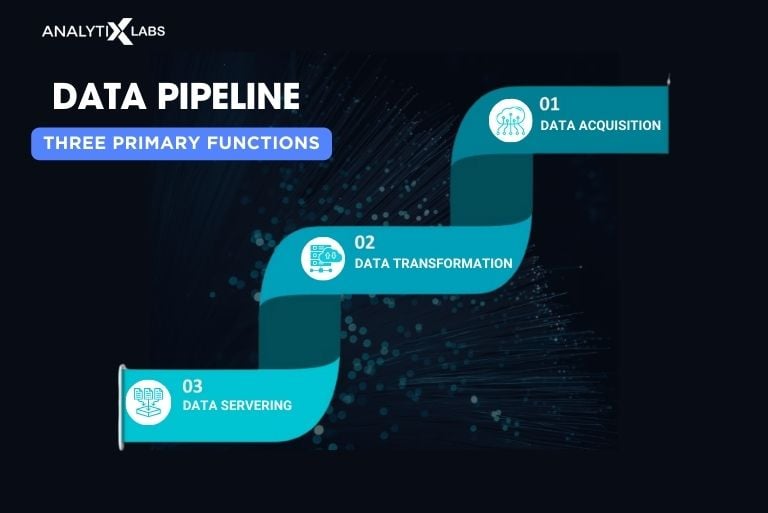
-
Data Acquisition
The first step in data engineering is to acquire data. This is typically done by extracting data from various sources or creating data by performing some operation on pre-existing information.
The data is then stored in a single targeted warehouse by moving the data from (as mentioned before) multiple sources such as NQSQL and SQL databases, websites, streaming services, IOT services, etc. This data can be structured, such as data tables, semi-structured, such as JSON and XML, or unstructured, such as text, audio, video, etc.
- Data Transformation
Data engineering aims to make data palatable for other data science professionals for analysis and downstream operations. Therefore, data transformation becomes an important step.
Here, the data is adjusted for the end user by performing various transformations. These can include missing value imputation, duplicate removal, conversion of data from unstructured to structured format, etc.
-
Data Serving
The last step in the data pipeline is serving the data to the end user. As mentioned earlier, the way the data is originally stored can be difficult for the end user to comprehend and use; therefore, data engineering ensures that the data is properly served.
Consider a BI platform intending to generate dashboards; in this case, the data should be organized and formatted in a tabular structure.
Conversely, when catering to an NLP platform tasked with building an AI model on the cloud using extensive data, the data should be provided on the cloud, containing only the text and corresponding ground truth labels, without any extraneous metadata or unnecessary details. Therefore, data delivery is dependent on the end user’s requirements.
Data engineering is a crucial field in the data science landscape.
Let’s discuss data engineering further and understand what you are expected to do as a data engineer.
What does a Data Engineer do?
When working in a data science team, the work can range from data acquisition, data management, data crunching, data mining, data modeling, data infrastructure management, model deployment, etc. The role of the data engineer, depending on the company’s size and the nature of the project, can vary significantly.
Data Engineer and associated job roles
- Data Engineer: There can be situations where the data engineer solely focuses on designing, preparing, and integrating the data infrastructure and addressing all data management norms.
- Data Architect: There can be other scenarios where the data engineer is more focused on ingestion, designing, and managing data sources or organizing and managing certain aspects of the existing data management system. In such scenarios, the data engineer might even be given the designation of Data Architect.
- Database Administrator: In other scenarios, the data engineer might only be focused on designing and maintaining the database system, ensuring its seamless access across the organization, and optimizing its speed. This is where the data engineer is generally referred to as a Database Administrator.
Common Tasks of a Data Engineer
As you can understand, a data engineer can perform roles in various ways, and based on their functionality, they might be designated with a different title than a data engineer (though the other designations are part of the field of data engineering only). To give you a better holistic understanding, though, here is a list of the major responsibilities of a data engineer-
- Acquiring data as per the business requirements
- Developing, supporting, and maintaining data streaming systems
- Develop and implement new systems for performing analytical operations, such as business analytics (BA) and business intelligence (BI)
- Develop, test, maintain, and optimize database pipeline architectures
- Develop data validation tools
- Handle compliance issues concerning the company’s security policy and the government’s law on data security, etc.
Different Types of Role Categories
Given the wide spectrum of work that can be performed in data engineering, you can categorize data engineers (and other associated job roles) into three broad categories. There are
- Generalist data engineers
- Pipeline Centric data engineers
- Database Centric database engineers.
-
Generalist Data Engineer
Such a type of data engineer refers to a data engineer working in small companies or organizations that have to handle the complete spectrum of the data engineering process. They are involved in data acquisition, management, transformation, cleaning to data serving, and even data analytics and modeling in some cases.
-
Pipeline-Centric Data Engineers
Such data engineers are typically found in mid-sized companies that deal with relatively more complex data (in terms of the volume and formats they handle), and the job roles between different data science professionals are a bit more clearly defined.
Such data engineers work with the data scientist to provide them with the acquired and transformed data. Here, the data engineer creates pipelines using their knowledge of distributed systems to provide the data scientist with seamless access to the right data.
-
Database Centric Data Engineer
Such a data engineer is expected to develop, handle, and maintain complex data pipelines in large companies with multiple databases across data warehouses. They are responsible for ensuring that the data typically spread across several databases becomes available to an end user at a single point.
Now that you have gained enough understanding regarding data engineering let’s get into the monetary compensation side.
How much do big data engineers make?
Data Engineering salary is satisfactory. For example, as per Glassdoor, the average data engineer salary in the United States is around $90T – $1L/yr. In India, this number is somewhere around ₹8,58,000 /yr. The range of salary can vary a lot. For instance, in India, the salary for a data engineer ranges from ₹3,96,000 to ₹20,00,000.
To properly understand how much data engineers make, you must consider the various factors affecting the data engineer’s salary. That is something we will discuss next in detail.
Factors Affecting Data Engineer Salary
Numerous factors can affect the average salary of a data engineer. Below are some of the significant factors that can impact the salary.
-
Experience Level
The experience level can significantly impact the average data engineer’s salary. For example, junior data engineers have experience of around 0-2 years and make an average salary of INR 3,50,000/yr, with the standard salary of mid-level data engineers being INR 5,00,000 /yr having 2-4 years of experience. Senior data engineers’ base pay is around 30,00,000 /yr, with lead Data engineers expected to earn around INR 40,00,000 annually. [source]
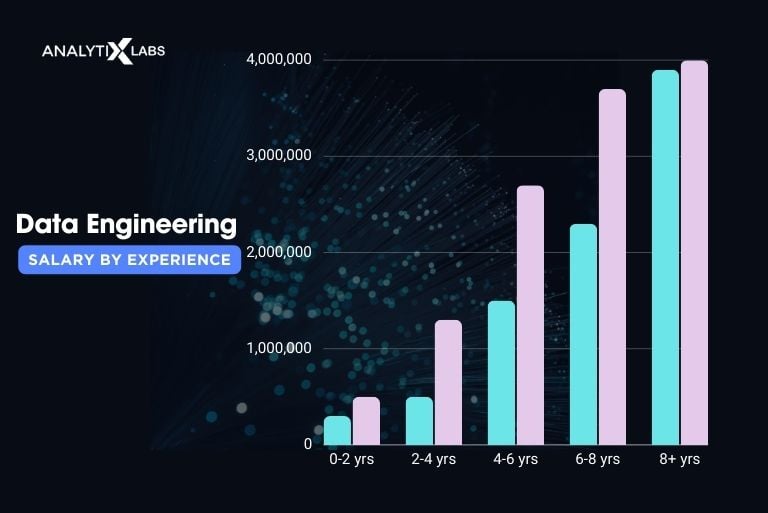
-
Education
Education can affect the data engineer’s salary. You are expected to have a bachelor’s degree. It’s generally helpful if your degree is from a STEM field. Individuals with degrees like Master’s in Computer Science or Data Science have comparatively higher salaries.
-
Certification
While education is important, having relevant certifications is helpful to justify yourself further for a data engineering job. The data engineering salary can also be maximized if you have specific certifications like the AWS Certified Big Data – Specialty certification, Cloudera Certified Professional Data Engineer, Google Professional Data Engineer, etc.
-
Location
The location is among the most important factors dictating the data engineer’s salary. The cities where data engineers earn the highest salaries include Seattle, San Francisco, and New York City, with average salaries of over $1,39,072 /year.
In terms of the average salary of data engineers, the top 5 countries are the United Kingdom (£51,814 /yr), the United States of America ($90T – $1L/yr), Germany (€70,000 /yr), New Zealand (NZ$1,05,000 /year), and Canada (CA$97,635 /yr).
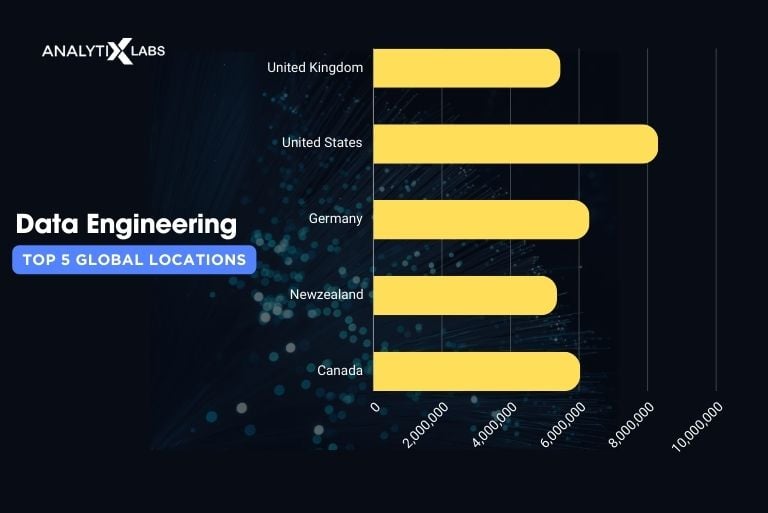
In India, the job opportunities for data engineers vary based on different cities. Tier 1 cities like Delhi, Mumbai, Bangalore, Chennai, Hyderabad, Chennai, Ahmedabad, and Pune are the best-paying cities for data engineers.
The highest-paying cities in India are Gurgaon and Hyderabad, with an average salary of data engineers around ₹10L /yr, followed by Bangalore at 9.3 LPA. Other cities where data engineers get good compensation include Delhi, with an average salary of ₹8,67,500 /yr, Chennai at ₹7,98,018 /yr, and Mumbai at ₹8,59,226 /yr. Cities that don’t fare that well in terms of average data engineer salaries include Jaipur at ₹6,05,685 /yr, Kolkata at ₹7,70,000 /yr and Ahmedabad at ₹6,19,207 /yr.
As you can see, the location can substantially affect the data engineer’s salary. The average data engineering salary is higher in cities like Hyderabad, Gurgaon, and Bangalore than in Kolkata, Jaipur, and Ahmedabad.
-
Skill Set
The skills that you have significantly drive the salary you can expect. The most prominent skills required for maximizing data engineering salary include the following-
- ETL Tools: There are numerous extract, transform, load (ETL) tools that you should know that can help you access data, clean and transform it, and load it in a suitable system for further analysis.
- SQL: It is the most common and useful language you need to know for using databases. A large amount of data is typically stored in large data warehouses that can be accessed using SQL. Therefore, knowing SQL is a must.
- Python: Several ETL and data management tasks can be performed using programming languages. The most common programming language is Python, making it a must-know language.
- Big Data Tools and Cloud Storage: Data Engineers should know a few big data tools as data engineers often deal with large amounts of data. Therefore, knowledge of tools like Hadoop is crucial. Cloud Services like Amazon S3, Google Cloud Storage, and Azure Data Lake Storage (ADLS) come in handy when managing big data, and data engineers should know at least one of these platforms.
- Query Engines: To be an effective data engineer, it is important to have a good knowledge of engines like Spark, Flink, etc., that help you run queries against large datasets.
- Data Warehousing: Earlier, we discussed that data engineers should maintain data warehouses; therefore, it’s crucial to possess a comprehensive understanding of data warehousing concepts such as Enterprise Data Warehouse (EDW), Operational Data Store (ODS), Data Mart, etc.
Also read: Top 30 Data Warehouse Interview Questions and Answers
Indeed, developing these skills is your gateway to a successful Data Engineering career. Take a step towards your career with AnalytixLabs, and enroll in our Data Engineering course today. Explore our signature data science courses and join us for experiential learning that will transform your career. We also have comprehensive and industry-relevant courses in machine learning, AI engineering, and Deep Learning. Explore our wide range of courses. P.S. Check out our upcoming batches or book a free demo with us. Also, check out our exclusive enrollment offers
To give you some context around the relative importance of these skills, let’s look at the average salaries associated with the skill sets above.
Knowledge of tools like Python and SQL provides an average salary of 8.5 and 8.6 LPA, respectively. Having skills around Hadoop and ETL comes in next, fetching you an average salary of 9 LPA as a data engineer. Amazon Web Services (AWS) and Apache Spark skills are crucial to maximize your earnings as they can provide you with an average salary of 9.8 and 10 LPA.
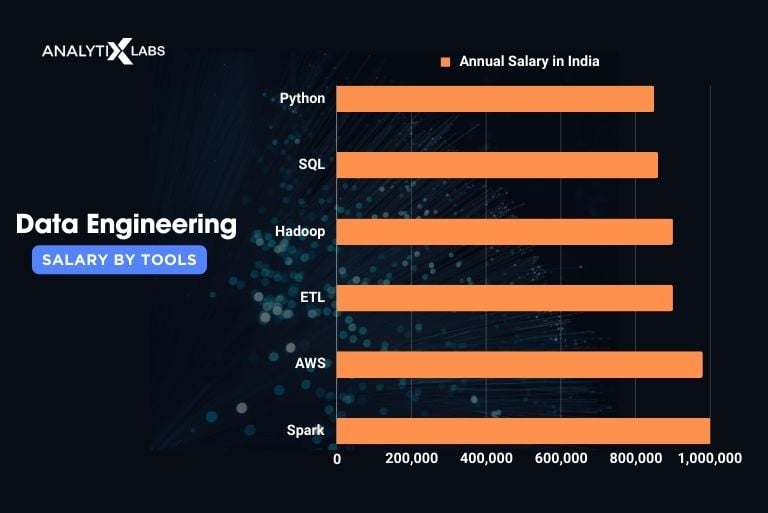
-
Employer
Data Engineers are generally paid more when working for larger companies than those working for smaller companies. The top companies that pay the highest include Google, Apple, Meta, etc.
In India, the companies that pay the highest to data engineers are Cognizant at ₹819,207/ year and IBM at ₹950,000/ year. Other companies offering good salaries to data engineers are Tata Consultancy Service at ₹591,375/ year, Accenture at ₹719,444/ year, Capgemini at ₹701,943 yr, Infosys at ₹543,783/ year.
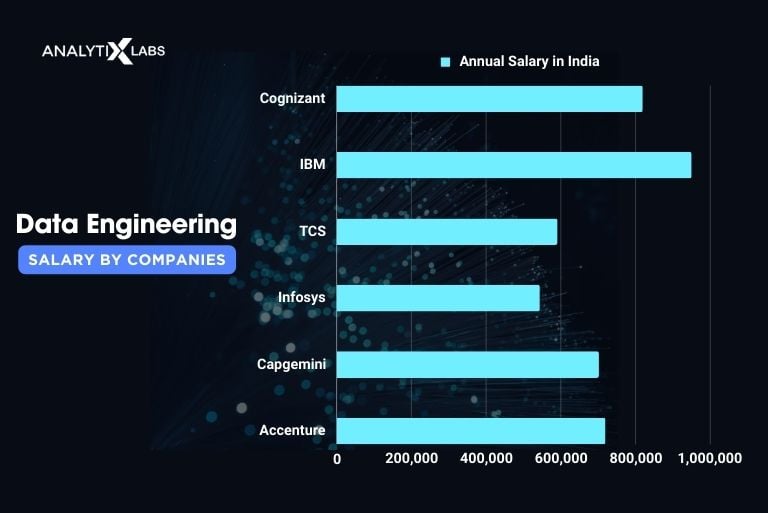
-
Industry
Today, all sorts of companies generate, manage, and analyze data. Therefore, data engineering is required across all sorts of industries. Thus, you should know the industries that pay data engineers the highest. Industries like finance, technology, and healthcare pay data engineers the highest, with an average salary of around $120,000 annually.
As you can notice, various factors can affect the average salary of a data engineer. However, one thing is for sure: the salary is decent.
Now, let’s also look at the salary trend for data engineers.
Data Engineer Salary Trends in India
Demand for data engineers is rising, with a projected 11% growth in computer and IT occupations, including data engineering, from 2019 to 2029, surpassing the average for other major occupations. According to the Dice 2020 Tech Job Report, India has experienced a 50% year-on-year growth in data engineering .
A key determinant of a data engineer’s salary is their experience level, but it’s not a straightforward correlation. We’ll explore the various levels of data engineers, the requisite skills for each level, and the average salary associated with each.
Salary of different Data Engineer levels
Data engineers fall into three categories: data engineers, senior data engineers, and lead data engineers. Your years of data engineer experience and skill set determine your level within these three categories.
Data engineer salary: Entry-level
Entry-level data engineers can be of two types – junior (entry-level) and mid-level data engineers.
Junior-level data engineers typically have 0-2 years of relevant work experience and have the following primary skills and roles-
- Preliminary knowledge of common data engineering tools.
- Accomplishing tasks assigned by seniors and managers.
- Building data pipelines that aren’t very complex and have low downstream dependence.
- Perform simple ad-hoc queries.
Mid-level data engineers have work experience of 2-4 years, have the following skills, and perform the following operations-
- Have above-average technical knowledge and can optimize data pipelines.
- Understand business problems and find ways to solve them through their data engineering knowledge.
- Own the data pipelines that aim at addressing a single business area.
The average salary of mid-level data engineers ranges from 3.4 LPA to 21 LPA, with the average salary being 10.8 LPA.
Data engineer salary: Mid-career
Mid-level data engineers generally have work experience of 4-7 years, hence they have the designation of Senior data engineers. The skills and responsibilities of data engineers working at this level are-
- Need to have subject matter expertise in multiple business areas.
- An in-depth understanding of business issues to formulate solutions and tasks for the team.
- Good communication skills to convey the identified problems and recommended solutions to the various teams.
- Responsible for optimization and implementation of work plans.
- In-depth knowledge of the various tradeoffs between the numerous available data sources and tools within the organization.
Senior Data Engineers typically make an average of 19 LPA with a salary ranging from 7.5 LPA to 35 LPA.
Data engineer salary: Lead
Lead and Principal data engineers typically have a minimum work experience of 7 years. The common skill requirements and responsibilities of data engineers at this stage are the following-
- Upskill the data engineers in your team and create high-level development plans for them.
- Identify the scope of the entire department you are in charge of.
- Plan the data architecture of the project or business unit.
- Identify ways to make the solutions scalable and maintain them.
- Build, maintain, and modify complex data pipelines that help resolve business problems.
The average salary of lead data engineers is 27.1 LPA, ranging from 15 LPA to 46 LPA.
Given the job responsibilities and the compensation around it, it’s crucial to discuss how you can become a data engineer if you want to become one.
How to become a big data engineer
If you have the required skill set and knowledge, you can launch your career in data engineering. Let’s examine all the knowledge and skills you need to become a data engineer.
-
Education
A formal degree is necessary to start becoming a data engineer. Typically, a university or college bachelor’s or master’s degree in a STEM field helps you to have a strong quantitative foundation. Companies typically seek candidates with bachelor’s degrees in computer science, data science, or other related fields. You must know that having the right education degree is not compulsory, but it’s a plus point.
-
Certifications
Professional certifications in data engineering can help your profile be much more valuable to potential employers. Apart from the certifications mentioned earlier, other crucial professional certificate degrees include the Certified Big Data Engineer (CBDE) from the Big Data Institute or Certified Data Engineer (CDE) from the Institute for Operations Research and the Management Sciences (INFORMS).
-
Technical Knowledge
There are several technical skills you need to have to become a data engineer. These include-
Relational and Non-Relational Database
The common solution for data storage is databases; therefore, knowledge of it is extremely crucial. You must have an in-depth knowledge of how various relational and non-relational databases work.
Automation and Scripting
Automation is a big part of data engineering. As a data engineer, you need to automate data pipelines so the organization can collect and transform large amounts of data at scale. Writing scripts helps data engineers automate repetitive tasks. Common methods and tools for scripting include Shell Scripting, Cron, etc.
Data Storage
Big data is heavily involved in data engineering. Therefore, knowledge of the various data storage solutions is a must. For example, you must be able to answer when to use a data warehouse rather than a data lake and should be able to design data solutions.
-
Technical Tools
Apart from technical knowledge, there are numerous tools you need to know about. Curucial tools include the following.
Coding Skills
Having a high level of proficiency in coding languages helps you to implement various data engineering solutions. The most common programming languages you must learn include SQL, NoSQL, Python, R, Java, Scala, etc.
ETL Tools
ETL process is the backbone of data engineering as it’s the process that allows you to move the data from various sources, such as databases, into a single repository, such as a data warehouse. Important ETL tools include Stitch, Alooma, Xplenty, Talend, etc.
Big Data Tools
As data engineers don’t work with regular data but with big data, knowing big data tools is a must for them. Popular big data tools used in data engineering include Hadoop, MongoDB, Kafka, etc.
Cloud Computing
Cloud storage and cloud computing are crucial for companies as maintaining physical servers by individual companies is becoming increasingly difficult. Common cloud computing tools are GCP, AWS, and Azure.
-
Soft Skills
Data engineers often need to present their findings to non-technical audiences. They must explain their data pipeline designs and how they fix the organization’s problems. Senior data engineers also need to upskill their teammates. To perform all these tasks, the soft skills required are communication, time management, teamwork, reporting, and presentation.
-
Portfolio
Once all the skills are attained, you must have a portfolio to make potential employers understand your worth. You can work on some independent projects and showcase your code on platforms like Git Hub. Another way to build a profile is by working as an intern or at a small startup and gaining experience and exposure.
-
Interview Preparation
Lastly, you need to get an entry-level job in the field. To do so, you must prepare for data engineering-based jobs. You can do so by preparing for common interview questions related to data engineering, revising key concepts, working on your resume, etc.
Conclusion
Data engineers are in high demand worldwide and have good salaries, given they have good enough skills. However, you must remember that the salary can differ based on location, work experience, employer industry, etc. If you find this field interesting, then you must pursue it, and you can expect to get decent compensation.
FAQs:
-
What is a mid-level Data Engineer’s salary?
A mid-level Data Engineer’s salary in India is around 8 LPA, with the salary going as far as 20 LPA.
-
Can a fresher become a data engineer?
A fresher can become a data engineer, given they have the relevant educational background, certifications, and skillsets. Typically, a good combination is a bachelor’s degree in the STEM field, a master’s degree in computer science or a similar field, certifications in data engineering, and crucial skillsets such as SQL, Python, Hadoop, Spark, and knowledge of Data Warehousing and Cloud Services like AWS, GCP or Azure.
-
How much does a data engineer make?
Different levels of data engineers earn differently. Entry-level data engineers make around 8 LPA, while mid-level data engineers make, on average, 17 LPA, with the lead/principal data engineers making around 26 LPA.
We hope this article helped you understand the field of data engineering and gave you some idea regarding the compensation of different types of data engineering levels. Please contact us to learn more about data engineering and its related fields.





![Tree Traversal in Data Structure Using Python [with Codes] tree traversal in data structure](https://www.analytixlabs.co.in/blog/wp-content/uploads/2025/01/Cover-Image-1-370x245.jpg)


